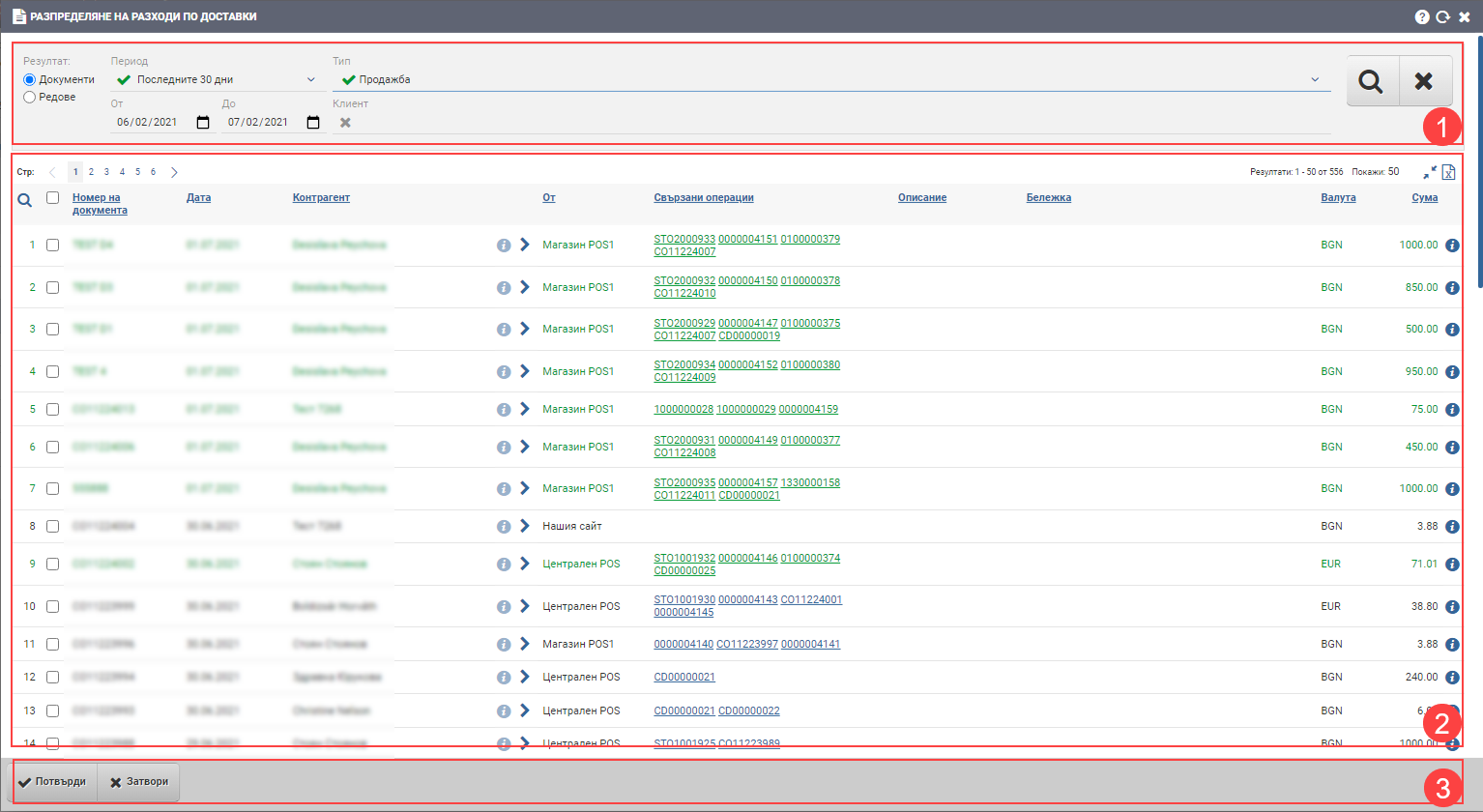Interface for allocating indirect costs of sales. It appears after you have selected the financial document or financial document line whose value you want to allocate. Here you need to select a specific sale/row of sales/sales rows for which you want to accrue additional expense.
Important! Allocation of indirect costs in the system happens ONLY by PRICE, not by quantity. That is, the higher the price of the item in the sale, the more indirect cost will accrue!
The interface consists of Filter (1), Result (2) and Buttons (3) :

Filter (1)
To find the sales or lines of sales you want to accrue an expense on faster, the system provides you with different ways to filter the information. The search is started with the Magnifying Glass, and the Hicks clears all filters. In the table below you will see all the filters and their explanations:
| Filter | Description | Further description of the options |
| Result | – Documents view (2.1) – Document Lines view (2.2) | |
| Period | Choose from a drop-down menu for which period to display your sales. Works by date of sale. | The possible options are: – Today – Yesterday – The last 7 days – Last 30 days – The last 365 days – Current month – Previous month – Current quarter – Previous quarter – Current year – Previous year – To date – shows all sales to date, from the first sale entered into the system, regardless of date. |
| From date – By Date | You select specific dates as the period for which to display sales. Works by date of sale. | |
| Client | You filter by a specific customer to which sales are created. | |
| Type | Filter by Sale Type. | The possible options are: – Sale – Retail |
Result (2)
You can see the documents/rows found according to the criteria set by the Filter in Result (3). The table changes the information according to the Result type, so they will be described separately.
Result by Documents (2.1)
| Column | Description |
| Checkbox | This is where you indicate which sales you would like the additional cost applied to. |
| Document number | Sale Number. |
| Date | Date of sale. |
| Contractor | Counterparty to the sale. |
| Opens a contractor file. | |
| Filters by counterparty. | |
| From | POS from which the sale was created. |
| Related operations | Displays the numbers of all transactions related to the sale. Clicking on your number opens the file of the related operation. |
| Description | The completed description of the sale. |
| Note | The completed note in the sale. |
| Currency | Currency of sale. |
| Sum | Amount of sale with taxes. |
| Opens a sale file. |
Result by Lines of documents (2.2)
A list of document rows will appear in your table. If a sale has 3 rows with 3 different items, here they will be on three different rows.
The row-by-row table contains the following columns:
| Column | Description |
| Checkbox | This is where you indicate which sales lines you would like the additional expense to be applied to. |
| Document number | Sale Number. |
| Date | Date of sale. |
| Contractor | Counterparty to the sale. |
| Opens a contractor file. | |
| Filters by counterparty. | |
| Code | Item/service code. |
| Name | Name of the item/service. |
| Opens an item/service file. | |
| Currency | Currency of sale. |
| Measure | Measure of the item/service. |
| Quantity | Quantity of the item/service from the sale. |
| Unit price | The price for 1 quantity in the sale. |
| Price | Amount with taxes of the item/service from the sale. |
| Opens a file on the sale. |
Buttons (3)
In order to allocate the costs to the sales/series of sales selection you have made, you need to click the Confirm button. This generates an Allocation of Additional Costs document that is visible in the Related Transactions tab of the sale file. All indirect costs already allocated, as well as financial documents that have not yet been allocated, can be found in Cost of sales.
If you want to exit without saving your changes, you need to click the Close button.